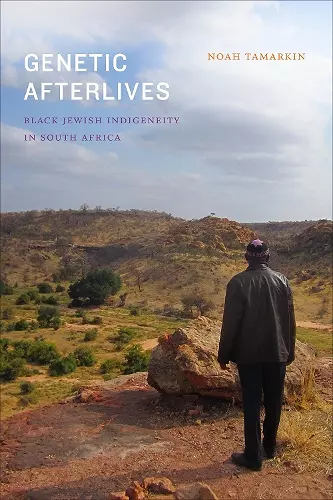Genetic Afterlives
Black Jewish Indigeneity in South Africa
Format:Paperback
Publisher:Duke University Press
Published:16th Oct '20
Should be back in stock very soon
This paperback is available in another edition too:
- Hardback£120.00(9781478008828)

In 1997, M. E. R. Mathivha, an elder of the black Jewish Lemba people of South Africa, announced to the Lemba Cultural Association that a recent DNA study substantiated their ancestral connections to Jews. Lemba people subsequently leveraged their genetic test results to seek recognition from the post-apartheid government as indigenous Africans with rights to traditional leadership and land, retheorizing genetic ancestry in the process. In Genetic Afterlives, Noah Tamarkin illustrates how Lemba people give their own meanings to the results of DNA tests and employ them to manage competing claims of Jewish ethnic and religious identity, African indigeneity, and South African citizenship. Tamarkin turns away from genetics researchers' results that defined a single story of Lemba peoples' “true” origins and toward Lemba understandings of their own genealogy as multivalent. Guided by Lemba people’s negotiations of their belonging as diasporic Jews, South African citizens, and indigenous Africans, Tamarkin considers new ways to think about belonging that can acknowledge the importance of historical and sacred ties to land without valorizing autochthony, borders, or other technologies of exclusion.
“Genetic Afterlives is a prescient examination of the Lemba community in southern Africa, a group that has long fought for public recognition of their claims to Jewishness over and against the identities imposed upon them as the price of admission into the political landscape of contemporary South Africa and beyond. Using careful ethnographic and archival research, Noah Tamarkin crafts an expansive portrait of the sparks that fly when contested oral histories, state-sanctioned social policies, and cutting-edge genetic research are held in critical and productive tension. This is a significant contribution to Jewish studies, African studies, anthropology, and science studies all at the same time. A very powerful read!” -- John L. Jackson Jr., author of * Thin Description: Ethnography and the African Hebrew Israelites of Jerusalem *
“In this major contribution to critical global Indigenous studies, Noah Tamarkin takes up a unique case study at the intersection of race, nation, and indigeneity while also explaining complex genome science and theoretical insights in accessible language that will resonate with diverse audiences.” -- Kim TallBear, author of * Native American DNA: Tribal Belonging and the False Promise of Genetic Science *
"Tamarkin's book will be of great interest to those interested in contemporary expressions of Jewish identity, in the ethnic dynamics of South Africa, in the ramifications of genetic testing, and, especially, in the ultimate 'ownership' of DNA." -- Ira Robinson * Nova Religio *
"Tamarkin pushes us to continue to find new ways to ask how DNA gains power in the world today. Hopefully, others will use it as an opportunity to take Africa seriously as a space from which to think through genetic ancestry." -- Victoria M. Massie * Transforming Anthropology *
"This book is recommended reading for anthropologists and scholars in STS, African studies, or Jewish studies. It would also likely appeal to curious laypeople as it revolves around the meaning of belonging in the religious, ethnic, state, family, and biological-genetic contexts. By dealing with the ways human beings create and express this belonging and affiliation, Genetic Afterlives calls on the reader to reconsider several accepted Western conventions." -- Nurit Kirsh * Isis *
"Genetic Afterlives is an instructive, interesting, and important addition to the humanities. It sheds light on a group of people that most laypersons are not familiar with, and provides detailed descriptions of the social, scientific, and cultural implications that face not just the Lemba, but all persons interested in DNA data research." -- Kimberley Burns * African Studies Quarterly *
"[A] fascinating exploration of why and how the Lemba of South Africa became interested in and engaged with genetic studies of Jewishness. . . . [A] masterful ethnographic exploration of the way scale and context matter in the production of genetic meaning." -- Kimberly A. Arkin * Anthropological Quarterly *
"This highly nuanced and important book contributes to many debates: as well as Black Jewish Studies, it challenges our understanding of identity more generally, showing that ingrained western notions of religion are more supple in other places. Tamarkin’s book also contributes to the study of African religions, apartheid studies, and to South African history. Perhaps most importantly, however, it contributes to contemporary debates on the nature of Judaism and Jewishness by arguing that such cannot be defined simply according to any single criteria." -- Michael T. Miller * Religion *
"A masterful exploration. . . . What makes this study significant is that Tamarkin pushes the limits of genetic research as a site of social, cultural, and political meaning. He vigorously points out the emerging ethnographic significance of DNA studies in relation to the free movement of religions in a globalized world. This is an essential break with essentialist visions of origins and identity." -- Edith Bruder * African Studies Review *
ISBN: 9781478009689
Dimensions: unknown
Weight: 408g
280 pages